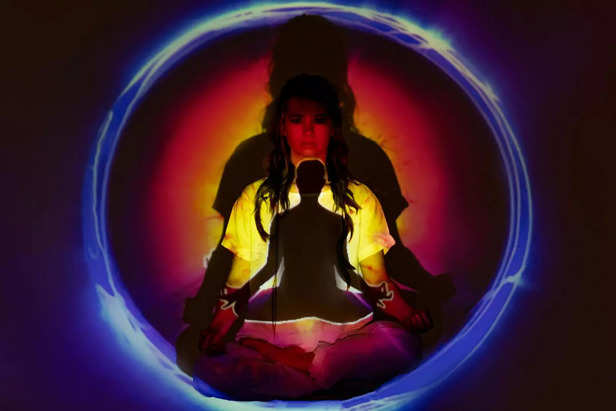The Gita’s Guide to Letting Go of What You Can’t Control
Riya Kumari | Mar 26, 2025, 12:05 IST
( Image credit : Times Life Bureau, Timeslife )
The Bhagavad Gita isn’t about becoming a stress-free robot. It’s about realizing that half the things we obsess over don’t actually matter. You do your best, and then you let it go. Simple. Hard? Sure. But also? Kinda liberating. So next time you catch yourself spiraling, just ask: Is this my battle? If yes, fight it. If not? Drop it. Then go have a snack. Krishna would approve.
There’s a moment in life—sometimes small, sometimes life-shattering—when you realize you have no control. You did everything right, yet things still fell apart. You worried, you planned, you calculated. And still, here you are, holding the weight of an outcome you never had the power to decide in the first place. The Bhagavad Gita has been saying this for over two thousand years: you are responsible for your actions, not their results. And yet, we live as if the opposite were true, as if the sheer force of our anxiety could shape the world. It doesn’t. It never did. And the sooner we grasp this, the lighter we become. Let’s talk about what it really means to let go—not in the passive, “whatever happens, happens” way, but in the active, powerful way that frees us from the unnecessary burdens we insist on carrying.

We like to believe that life works like an equation: Effort + Good Intentions = Desired Outcome. But life, as you’ve probably noticed, does not operate like a math problem. It behaves more like the ocean—vast, unpredictable, and utterly indifferent to your plans. Krishna tells Arjuna: “You have the right to your actions, but not to the fruits of your actions.”
This is not a command to stop caring. It is an invitation to act with full sincerity, but without desperation for a particular result. Because here’s the truth: when we anchor our happiness to an outcome, we give the world power over us. We set ourselves up for pain, not because life is cruel, but because we pinned our peace to something we could never control.

There’s a difference between letting go and giving up. The Gita does not teach detachment in the sense of apathy; it teaches non-attachment in the sense of freedom. To be non-attached is to give your best without the fear of loss. It is to love deeply, without demanding permanence. It is to strive for excellence, without being broken by failure. It is to do what is right, simply because it is right, and let the universe handle the rest.
Imagine carrying a heavy bag that is not yours to keep. You clutch it tightly, fearing what will happen if you let go. But the bag was never yours to begin with. And one day, when you’re too exhausted to hold on, life will take it from you anyway. So why not put it down now, on your own terms?

A lot of our suffering comes from how we define ourselves. We build identities around achievements, relationships, and external validation—forgetting that none of these things are stable. The Gita reminds us: You are not what you win. You are not what you lose. You are something far greater than circumstances.
Life is cyclical. Today’s triumphs will fade. Today’s disappointments will too. The only thing that remains is you—the one who experiences them all but is bound by none. The sooner you realize this, the less life’s ups and downs will shake you.
The Wisdom to Let Go
We like to think we suffer because of life’s unpredictability. But in truth, we suffer because of our resistance to it. Letting go is not passive. It is an act of great wisdom and greater courage. It is knowing when to fight and when to surrender. It is understanding that some things are worth our energy, and others are better left untouched. It is choosing peace over the endless, unwinnable war of control. Because in the end, life will do what it does. The only real choice we have is whether we let it flow through us, or let it drown us.
1. The Illusion of Control Is the Root of Suffering

Goal
( Image credit : Pexels )
We like to believe that life works like an equation: Effort + Good Intentions = Desired Outcome. But life, as you’ve probably noticed, does not operate like a math problem. It behaves more like the ocean—vast, unpredictable, and utterly indifferent to your plans. Krishna tells Arjuna: “You have the right to your actions, but not to the fruits of your actions.”
This is not a command to stop caring. It is an invitation to act with full sincerity, but without desperation for a particular result. Because here’s the truth: when we anchor our happiness to an outcome, we give the world power over us. We set ourselves up for pain, not because life is cruel, but because we pinned our peace to something we could never control.
2. Non-Attachment Doesn’t Mean Indifference—It Means Freedom

Fly
( Image credit : Pexels )
There’s a difference between letting go and giving up. The Gita does not teach detachment in the sense of apathy; it teaches non-attachment in the sense of freedom. To be non-attached is to give your best without the fear of loss. It is to love deeply, without demanding permanence. It is to strive for excellence, without being broken by failure. It is to do what is right, simply because it is right, and let the universe handle the rest.
Imagine carrying a heavy bag that is not yours to keep. You clutch it tightly, fearing what will happen if you let go. But the bag was never yours to begin with. And one day, when you’re too exhausted to hold on, life will take it from you anyway. So why not put it down now, on your own terms?
3. You Are Not Your Success. You Are Not Your Failure

Meditation
( Image credit : Pexels )
A lot of our suffering comes from how we define ourselves. We build identities around achievements, relationships, and external validation—forgetting that none of these things are stable. The Gita reminds us: You are not what you win. You are not what you lose. You are something far greater than circumstances.
Life is cyclical. Today’s triumphs will fade. Today’s disappointments will too. The only thing that remains is you—the one who experiences them all but is bound by none. The sooner you realize this, the less life’s ups and downs will shake you.
